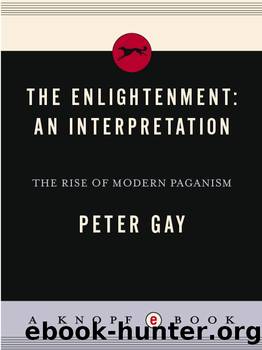Enlightenment Volume 1 by Peter Gay

Author:Peter Gay [Gay, Peter]
Language: eng
Format: epub
ISBN: 978-0-307-83137-8
Publisher: Knopf Doubleday Publishing Group
Published: 2013-04-09T16:00:00+00:00
III
Looking back upon these centuries with their disrespectful, disenchanted eyes, the philosophes saw a time of great beginnings. It has often been said, and it is true, that the Enlightenment lacked the intimate knowledge of local history, the generous appreciation of philosophical speculation, and the full understanding of international politics, on which the recognition of the Renaissance dependsâit would have been interesting to see Gibbonâs interpretation of Florence under the Medici, a history he planned but never wrote. Certainly the subtleties of nineteenth- and twentieth-century scholarship make the philosophesâ pronouncements on the Renaissance often appear ignorant or naïve.15 It is true, too, that the Enlightenment made no marked advance over Bayleâs vigorous restatement of the Humanistsâ thesis that, beginning with Petrarch and ending with Erasmus, there had been a ârevival of letters and the arts,â first in Florence, then in other Italian cities, and finally in the northern countries of Europe.
This conception falls short of the grandiose âRenaissanceâ discovered by Micheletâs febrile imagination and Burckhardtâs synthetic scholarship. The philosophes simplified much in the Renaissance that was complicated, missed much that was interesting. But they seized on the essential thing: when men of letters single out a preceding age for reviving letters, this is weighty praise. The revival was not merely literary: the Humanistsâ passion for form and their search for pure classical texts was the precondition for a change in styles of thinking. Imitationâon this Gibbon insisted with special firmnessâimitation is the foundation for independence, the youthful acquisition of the materials for autonomy: âGenius may anticipate the season of maturity, but in the education of a people, as in that of an individual, memory must be exercised, before the powers of reason and fancy can be expanded; nor may the artist hope to equal or surpass, till he has learned to imitate, the works of his predecessors.â Petrarchâs revolt and the revolt of his immediate successors had been largely a call for good taste: the Scholastics were barbarians to them because they wrote barbarous Latin. But form has its content: the search for texts exercises the critical mentality not merely by what it finds but by the way it seeks. Hence the philological rebellion issued in a philosophical revolution: âThe study and imitation of the writers of ancient Rome,â Gibbon noted, brought in its train not merely a âpurer style of compositionâ but also a âmore generous and rational strain of sentiment.â In short, âin Italy, as afterwards in France and England, the pleasing reign of poetry and fiction was succeeded by the light of speculative and experimental philosophy.â16 Petrarch, after all, as I have said, was admirable to Gibbon because he revived not merely the study but also the spirit of the Augustan Age; and, we may add, Petrarch revived that spirit precisely by reviving the study.
Since the Enlightenment saw the Renaissance as an evolution, with the light of philosophy succeeding the reign of fancy, it was only natural that the philosophes should feel the closest affinity with the writers of the late Renaissance.
Download
This site does not store any files on its server. We only index and link to content provided by other sites. Please contact the content providers to delete copyright contents if any and email us, we'll remove relevant links or contents immediately.
| Africa | Americas |
| Arctic & Antarctica | Asia |
| Australia & Oceania | Europe |
| Middle East | Russia |
| United States | World |
| Ancient Civilizations | Military |
| Historical Study & Educational Resources |
Magic and Divination in Early Islam by Emilie Savage-Smith;(1534)
Papillon by Henry Charrière(1439)
Bohemians, Bootleggers, Flappers, and Swells: The Best of Early Vanity Fair by Bohemians Bootleggers Flappers & Swells- The Best of Early Vanity Fair (epub)(1419)
Ambition and Desire: The Dangerous Life of Josephine Bonaparte by Kate Williams(1394)
Twelve Caesars by Mary Beard(1323)
What Really Happened: The Death of Hitler by Robert J. Hutchinson(1167)
Operation Vengeance: The Astonishing Aerial Ambush That Changed World War II by Dan Hampton(1164)
London in the Twentieth Century by Jerry White(1149)
The Japanese by Christopher Harding(1133)
Time of the Magicians by Wolfram Eilenberger(1131)
Twilight of the Gods by Ian W. Toll(1123)
Lenin: A Biography by Robert Service(1080)
The Devil You Know by Charles M. Blow(1028)
A Social History of the Media by Peter Burke & Peter Burke(985)
Freemasons for Dummies by Hodapp Christopher;(966)
Napolean Hill Collection by Napoleon Hill(948)
Henry III by David Carpenter;(924)
The Rise and Triumph of the Modern Self by Unknown(923)
Richard III (The English Monarchs Series) by Charles Ross(913)
